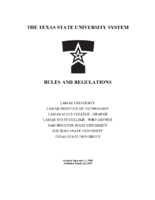Martha Brunson oral history interview
Description
Dr. Brunson discusses the changes the university's at Texas State has seen over the years. She talks about the challenges of being a woman professor and certain women faculty members, specifically in the English department. Along with discussing the English department's offerings and history, she describes the ways that different university presidents' administrations', including Billy Mac Jones and Dean Ralph Randolph, affected the English department's curriculum and operations. Dr. Brunson recalls her time as chair of the department and helping to establish the Therese Kayser Lindsey Chair. Dr. Brunson reflects on some of her department colleagues, including Dr. Ralph Houston. She talks about changes in students' preparation and changes for women on campus, including the creation of a women's studies minor.




